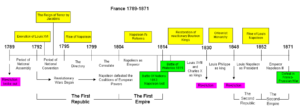Yvon Beaudoin fills in the background for us:
On May 1, 1804, Napoleon succeeded in having the Senate bestow upon him the title of hereditary Emperor of the French. For all intents and purposes, he re-established the monarchy that the Revolution had destroyed. At the time, he was so popular that by means of a plebiscite the people approved the vote of the Senate. The feasts of consecration and of crowning in the presence of Pope Pius VII on December 2, 1804 were carried out with solemnity. The Emperor took up residence at Les Tuileries and held court there like the kings of old.
http://www.omiworld.org/en/dictionary/historical-dictionary_vol-1_e/711/empire/
When Napoleon came to power, he accommodated the Church, but controlled it for his own purposes. It was during this period that Eugene became a seminarian in Paris.
The relations between Rome and Paris were good for a few years. But, having defeated several coalitions, Napoleon wanted to impose the Concordat on all countries where he held sway, especially in Italy, Austria, Belgium and Holland. The Pope opposed this, refusing at the time to grant canonical recognition to the new bishops and by so doing practically rendered the Concordat inoperative. The French troops then seized Rome and the Pontifical States were annexed to the Empire by a decree of May 17, 1809. Pius VII, without mentioning Napoleon by name, excommunicated all those who took part in this action. The Pope was subsequently brought to Savona, Rivière de Gênes, where he stayed for four years and the Italian cardinals were dispersed as far away as Paris. http://www.omiworld.org/en/dictionary/historical-dictionary_vol-1_n/867/napoleon-i/
Eugene learnt to work clandestinely for the cause of the imprisoned Pope, who had excommunicated Napoleon, whom Eugene referred to as “the abominable tyrant, enemy of everything that is good.”
In July of 1808. Pius VII responded to these vexations by a bull of excommunication. But Napoleon forbade its publication in France. Mr. Émery succeeded in getting his hands on a copy and had it transcribed by Abbé de Mazenod to have it subsequently distributed in France. From that time until June of 1810 when Napoleon forced Mr. Émery to leave the seminary, Eugene was a member of the committee dubbed the orium where in the greatest secrecy, documents issued by the Pope or certain cardinals were transcribed. They were then distributed throughout France by trustworthy individuals. If they were taken in flagrante delicto , these volunteer scribes were liable to very severe penalties.
http://www.omiworld.org/en/dictionary/historical-dictionary_vol-1_e/710/mery-jacques-andr-sulpician/


What a wonderful gift it is to be led into going deeper and learning more about the time, about those who surrounded Eugene and even about Eugene himself. There is such a richness to this history which has come alive – it is more than just dates and facts as on the diagram above. Hearing the stories, being able to share then in the memories it all comes alive. In a time of darkness and terror there seems always to be those people who are like small lights.
Reading Eugene’s 1842 account of his relationship with Abbé Émery I see the emergence of a heart that is becoming as big as the world, of a heart that loves greatly. “I took care to the good old man during his last days as a way of repaying him for the freedom with which he allowed me to approach him and speak openly to him like a son to a father.” This strikes me – for this wasis the type of relationship (or so it seems to me) that Eugene would have with his Oblates as the years passed. “A father’s communication with his many children… that is one of the most agreeable occupations of my life” which he wrote in 1857.
I have always thought that Eugene, St. Eugene was someone very very special. But today’s gift of being able to get to know him even more deeply has touched my heart in a special way – much as I was touched when Fr. Jim first read to me Eugene’ letter to Henri Tempier. There is another great invitation to love.
Hi Frank, thanks for this history of the political mileu in which St. Eugene established our Order. It must have been a difficult time for the Church, for the clergy and for the lay but it was also a time of recovery of religion from the excesses of the Revolution.
In reading further about the Concordat, I see it was in place in France until 1903 or so – and incredibly still in place in Alsace to this day!
Does this mean the State appointed St. Eugene as Bishop of Marseille and that he was in effect an employee of the state (no doubt against his will) throughout his whole ministry? Just curious about the implications of the Concordat on St. Eugene and how this may have affected him personally.
We’ll be coming to that soon in the letters and the dark night that Eugene was to experience as Bishop of Icosia.
Thanks for responding, David, it is always a joy when people react to this blog – it make my day!
I appreciate the context in which St Eugene was moved by grace to found the congregation…my best course in college, (PS… at St Patrick’s College Ottawa) was by the late Fr Hugh MacDougall OMI on the beginnings of the 19th century as found in the writers of the Enlightenment and on to Pio Nono etc. To read the diary of someone in 1813 makes the founding period come alive.